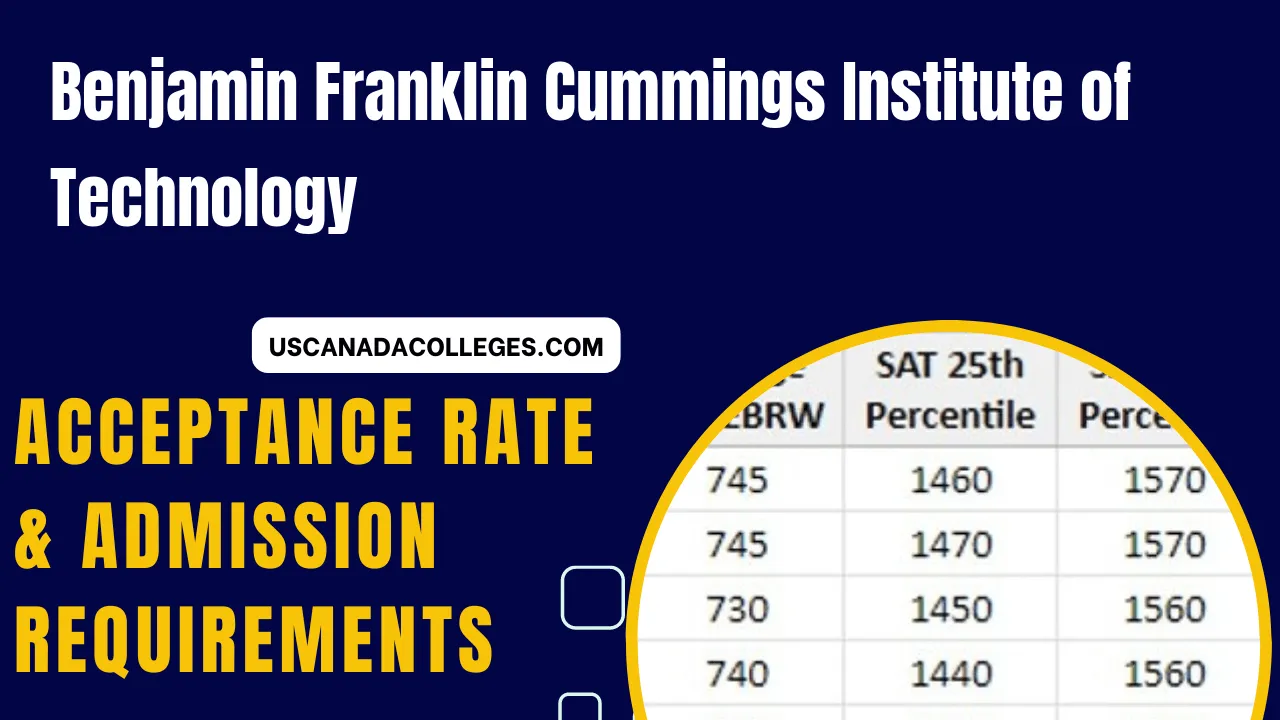Benjamin Franklin Cummings Institute of Technology is not selective in its admission process. The acceptance rate of Benjamin Franklin Cummings Institute of Technology (Franklin Institute of Boston) is 100%. This means that all applicants are admitted.
How Competitive are Benjamin Franklin Cummings Institute of Technology Admissions?
- Not Competitive: Applicants with satisfactory academics can easily secure admission.
- A holistic review considers essays, recommendations, and leadership roles.

However, a 100% acceptance rate or open admission policy does not guarantee admission. Every institution has minimum eligibility criteria. If you meet these conditions, then you can be certain of admission. Additionally, to secure admission, you must convince the admission staff that you are mentally and physically fit for the course of studies.
Benjamin Franklin Cummings Institute of Technology Admission Requirements
Franklin Institute of Boston GPA Requirement
Can I Get Into Franklin Institute of Boston Without SAT Or ACT?: The admission test score (SAT/ACT) policy for Benjamin Franklin Cummings Institute of Technology is unknown. But it is better to submit the test score if you have performed well in the test. It gives an extra opportunity to showcase your skills and competencies and hence will improve your chances of admission. Check the schedule of the test and plan accordingly. It is advisable to appear multiple times in the test unless you score well above the average SAT / ACT score of the admitted students, as given below. Normally, students may appear in the test 4 to 5 times to improve their scores. But if your score is not up to the mark and is less than the national or state average, then it is better not to submit the score as it will impact negatively.
Benjamin Franklin Cummings Institute of Technology (Franklin Institute of Boston) SAT Requirements
Each school has different requirements for SAT and ACT testing. Only a few schools require the SAT or ACT, but many consider your scores if you choose to submit them. The test score policy is already mentioned.
Franklin Institute of Boston Profile
Name: Benjamin Franklin Cummings Institute of Technology (Franklin Institute of Boston)
City: Boston
URL: www.bfit.edu/
State: Massachusetts
Type: Non-Profit Private
Zip: 2116
Campus: Main
Accredited by: New England Commission on Higher Education (NECHE)
How much does a degree from Franklin Institute of Boston Cost?
The average annual cost of the degree at Benjamin Franklin Cummings Institute of Technology is USD: 28971. As most of the students receive Pell Grants and Federal Grants the average annual net price a student has to pay at Benjamin Franklin Cummings Institute of Technology is much less than this.
How can I get a scholarship?
44.27% of the students are receiving Pell Grant and 50.7 percent are receiving Federal Grants. So it is a better choice to go to Franklin Institute of Boston and apply for PELL or federal loan grants.
At Benjamin Franklin Cummings Institute of Technology, you will have no problem receiving any scholarship from the federal government. Fill in the FAFSA application form at the earliest and enlist Franklin Institute of Boston as your choice in the form.
How much a Franklin Institute of Boston Graduate make?
The average annual salary of the Franklin Institute of Boston graduate after 4-6 years of graduation is USD 57556. An average Franklin Institute of Boston graduate makes this much after 10 years of enrollment (4-6 years after graduation).
The average annual income of a graduate in the United States is USD: 40595
Degree Programs
Bachelor Degree Programs
- Electrical, Electronics and Communications Engineering
- Health and Medical Administrative Services
- Mechanical Engineering Related Technologies/Technicians
- Vehicle Maintenance and Repair Technologies
Associate Degree Programs
- Business Administration, Management and Operations
- Computer Engineering Technologies/Technicians
- Construction Management
- Drafting/Design Engineering Technologies/Technicians
- Electrical and Power Transmission Installers
- Electrical Engineering Technologies/Technicians
Full list of All degree programs offered by Benjamin Franklin Cummings Institute of Technology.
Data on this page is sourced from IPEDS, College Scorecard's latest data as provided in 2024, US Department of Education's latest 2024 statistics, Institute's official websites and printed material as well as additional publicly available sources.
